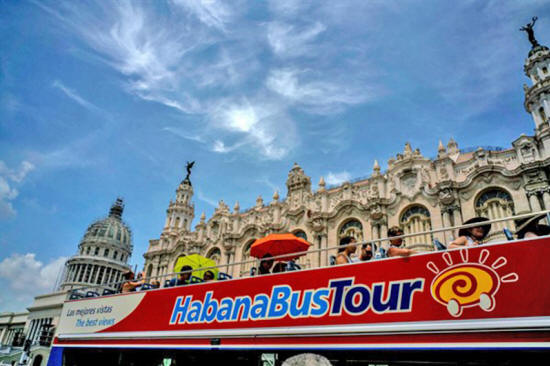|
June 20, 2017 from WorldPoliticsReview Website
Cuba's National Capitol Building, Havana, June 17, 2017 (AP photo by Ramon Espinosa).
That declaration was not quite true, since there was no single deal to cancel.
President
Barack
Obama's opening to Cuba included a series of bilateral agreements on
issues of mutual interest and five packages of
regulatory changes to the U.S. embargo that Obama made
unilaterally in order to boost travel and trade.
No more self-guided
tours - but visitors can still bring back rum and cigars.
Those exceptions are important because they let U.S. cruise lines, airlines and tech companies off the hook.
Of approximately 40 nonagricultural deals signed between U.S. and Cuban companies before Trump took office, almost all would be exempt.
Only two hotel
management deals, by Starwood Hotels and Wyndham Worldwide, would
not be legal under the new regulations. But they are safe, too,
because the presidential memorandum exempts existing contracts so as
not to "disrupt" ongoing business, not to mention for fear of
litigation.
Trump did not break
diplomatic relations or put Cuba back on the State Department's
terrorism list. He did not restore the "wet foot, dry foot" policy
that gave Cuban immigrants who made it to U.S. shores preferential
treatment.
Trump's Miami speech embraced regime change wholeheartedly, as symbolized by the venue:
Trump denounced the Cuban government as brutal, criminal, depraved, oppressive and murderous.
He declared his support for Cuba's dissidents, and promised that the current regime's,
Obama's policy of normalizing relations is out the window, and the well-worn policy of hostility is back in fashion.
What Trump really meantby "canceling" Obama's "deal"was that he is repudiating his predecessor's decisionto abandon the goal of regime change.
The fundamental dilemma now facing Trump is the same dilemma that faced previous U.S. presidents. The policy instruments he has deployed are inadequate to the ambitious goal he has set.
The new travel restrictions will, at best, marginally reduce the total number of foreign visitors to Cuba:
Banning U.S. companies from doing business with Cuban enterprises managed by the military simply opens the door to their competitors in Europe, Russia and China.
In short, Trump's
new sanctions may put a dent in the Cuban economy, but they will
hardly deal it a death blow.
In a defiant statement following Trump's address, the Cuban government declared that,
There is, however, one group of Cubans who will suffer disproportionately under the new sanctions - Cuba's nascent private sector, which has been built around tourism.
Packaged tours, by
contrast, operate through the state-run tourist agencies, lodging
visitors in state-owned hotels.
One study estimated
that U.S. visitors to Cuba
generate $1.65 billion in revenue annually for American
businesses and account for more than 12,000 jobs.
It includes a single paragraph authorizing continued engagement with Cuba on topics that serve U.S. interests, such as migration, law enforcement, public health, agricultural cooperation, environmental protection, civil aviation safety and scientific exchange.
This endorsement of
dialogue suggests that the Trump administration will not abrogate
the 23 bilateral agreements on many of these same topics signed
during the Obama administration.
The Trump administration suspended them all pending its policy review, except for the semi-annual consultation mandated by the 1995 migration accord.
With a new policy in place, talks on
issues of mutual interest could resume unless the administration
imposes onerous preconditions.
Over the next few months, Trump's new policy will come into clearer focus as the Treasury Department promulgates the new regulations governing travel and business.
The devil is always in the details, and diplomats will feel out one another about whether continued progress is possible on issues of mutual interest.
Was Trump's
rhetorical blast in Miami a one-time reward to his conservative
Cuban-American audience, or the opening salvo in an escalating war
of words?
Although his policy
of hostility and regime change has no chance of success, U.S.-Cuban
relations are likely to remain frozen for the next four years in a
posture of acrimony that serves neither country's interests.
|


